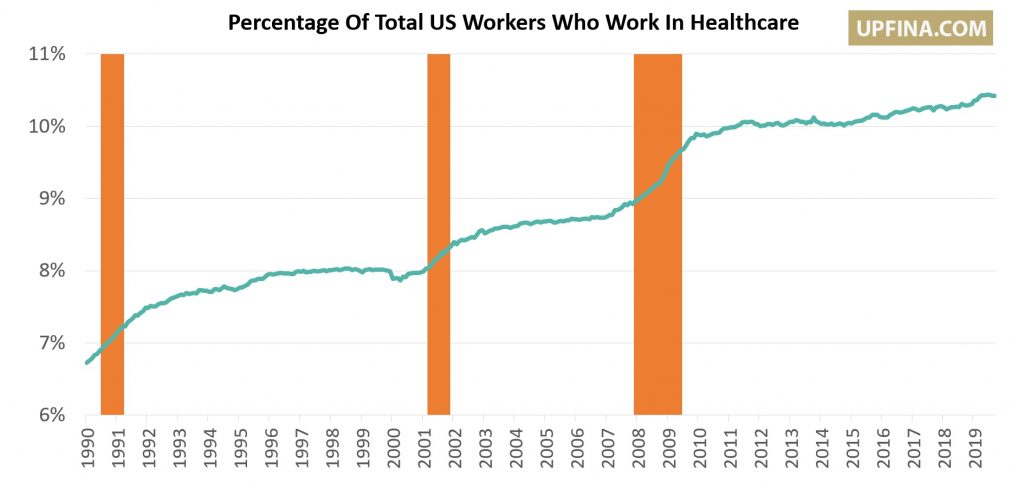From Upfina:
The U.S. economy is becoming less cyclical which means it needs a greater decline in its cyclical part to generate a recession. The fact that the U.S. consumer has deleveraged in this cycle is probably the most important reason the economy is in its longest expansion since the 1800s. The secondary reason is the rise of acylical sectors like healthcare. These healthcare jobs are replacing the old manufacturing jobs of previous decades. This is a big shift since manufacturing is extremely cyclical. There have already been two manufacturing slowdowns in this expansion (we’re in the 2nd one now).
If the U.S. labor market relied more on the oil and gas industry, there would have been a recession in 2016. Interestingly, even though the US is producing the most oil and gas ever, the industry doesn’t employ as many workers as it did in the 1980s. As of September, the industry employed 161,300 workers. The peak was 200,800 in 2014 which is still way less than 1% of the labor market. That’s nothing compared to the peak in 1982 at 267,000 when the overall labor market was much smaller. Fracking doesn’t require that many workers. The whole industry has gotten much more efficient just like in all of manufacturing.
Healthcare is going in the opposite direction because of aging demographics. As you can see from the chart below, in 1990, 6.7% of American workers were in healthcare and now the percentage is 10.4%.

You can tell healthcare isn’t cyclical because its percentage of the labor market increases during recessions. The orange bars are recessions. It rarely has given back any gains in the past 29 years. With healthcare being so important, it helps stabilize the labor market in cyclical slowdowns........MORE
*On recession (or depression) porn, see Bloomberg's Virginia Postrel at her personal blog, December 4, 2008 i.e. about halfway through the worst of the 2008 - 2009 market collapse:
Depression Lust, and Depression Porn
If anyone should fear a Depression, it should be journalists, who are already the equivalent of 1980s steelworkers. But instead, they seem positively giddy with anticipation at the prospect of a return to '30s-style hardship--without, of course, the real hardship of the 1930s. (We're all yuppies now.) The Boston Globe's Drake Bennett asked a bunch of people, including me, what a 21st-century Depression might look like. The results sounded pretty damned good to some people--a sure sign of an affluent society, or at least affluent commentators.
The prospect of a Depression is already creating jobs for (a few) writers. Hodding Carter IV has gotten a book deal described by Publishers Weekly this way:
After 10 years of profligate spending fueled by real estate flips, refinancing and credit card debt, the author will write about living on what he actually earns. In order to do so, he and his family of six will mine cost-saving techniques from the Great Depression and the first cookbook in America, and stay within their budget, whether that means growing their own food or bartering for things they need. Carter is writing a column based on his experiences for Gourmet.If that last line doesn't bring a smile to your face, you really are depressed....MORE